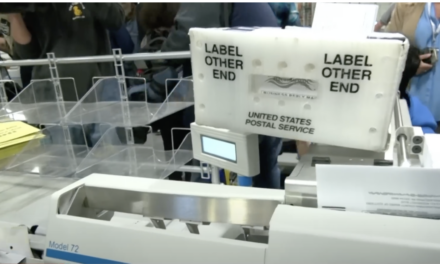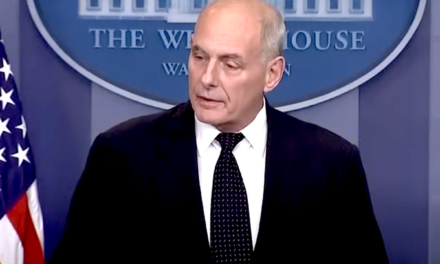We support our Publishers and Content Creators. You can view this story on their website by CLICKING HERE.
On the campaign trail in early October, a reporter asked Vice Presidential Nominee J.D. Vance about new reporting from Bob Woodward that Donald Trump had private phone calls with Vladimir Putin after leaving office. Vance replied, “I honestly didn’t know that Bob Woodward was still alive until you just asked me that question.”
Vance’s response is indicative of Woodward’s slide into irrelevance in recent years. He’s drifted from the world-famous shoe-leather reporter who famously took down Nixon to someone who seemed all too comfortable in the corridors of power.
This shift is why my new book co-authored with Kent Heckenlively, Twilight of the Shadow Government: How Transparency Will Kill the Deep State, opens with a chapter titled, “The Lies of Bob Woodward.” Let me cut to the chase and tell you what I really believe: Bob Woodward is likely to be the number one disinformation agent of the Deep State. Let’s start with the facts.
We started with Woodward’s own fairy-tale account of his life, enrolling in Yale on an NROTC scholarship and studying history and English literature. Did you know the Ivy Leagues are the prime recruiting grounds for the intelligence agencies, and they love those liberal arts majors?
From Yale, he goes to the Navy for five years, but neglects to inform the public that he was an intelligence briefer for General Alexander Haig, who would go on to become chief of staff in the Nixon White House. In that role, he also briefed Admiral Thomas Moorer, who was the chief of naval operations and later chairman of the Joint Chiefs of Staff. It’s only because of a fabulous book by two-time Pulitzer-prize nominated writer, Ray Locker, Haig’s Coup, that we have this information.
Woodward wants us to believe he traded in a life of briefing admirals and generals at the highest levels of our government for that of a journalist. And we’re not supposed to be suspicious that after just a year of writing for the Montgomery Sentinel, a weekly paper of the Washington, D.C. suburbs, he got a job at The Washington Post?
Not likely. Somebody tipped the scales for Woodward. Somebody powerful.
We believe it’s more plausible he was a Project Mockingbird placement, the CIA-run program revealed in the wake of Watergate by the Church Commission, in which more than 400 journalists were revealed to be on the payroll of the CIA. Former Washington Post owner Philip Graham was one of those CIA recruits. (And his widow, the distinguished Katherine Graham, has an auditorium named after her at CIA Headquarters in Langley, Virginia.)
For decades there was a national guessing game as to the identity of “Deep Throat,” the anonymous source, thought to be a senior White House official who was feeding Woodward information. In truth, it would eventually be revealed by Woodward that his source was Mark Felt, the number two man at the FBI, who had been passed over for promotion by Nixon. Felt would also be convicted of violating the civil rights of Americans by spying on anti-war protestors but be pardoned by President Reagan.
I was on the protective detail for CIA Director Casey in his final days, and I can tell you Bob Woodward did not break into Casey’s hospital room and question Casey as to why he’d traded arms for hostages as part of the Iran-Contra scheme — a lie Woodward tried to peddle in his book, Veil: The Secret Wars of the CIA.
But I must confess that Woodward did receive a remarkable amount of access to Casey, more than any other journalist. I remember talking with the other agents about it. We’d say, “This is the guy who brought down Nixon, why’s the director being so friendly with him?”
It was only in later years, listening to a Nixon interview, that I learned he was looking to slash the CIA by about a third. Eisenhower warned against the military/industrial complex (I’d add intelligence to that as well), Kennedy vowed to shatter it into a thousand pieces and scatter it to the winds, and I believe Nixon came to share these sentiments as well. Truman later stated that his biggest mistake in the presidency was the creation of the CIA. Republican or Democrat, if you genuinely look at the CIA, you see the same problem.
How did Woodward do in his later journalistic adventures?
In 2012, Politico published a long article on six instances in which Woodward’s honesty has been called into question by other journalists, beginning with a claim “that legendary Washington Post editor Ben Bradlee once expressed ‘fear in my soul’ that Bob Woodward had embellished elements of his reporting in the Watergate scandal.” Other Woodward claims questioned by other journalists were Casey’s deathbed confession, an alleged quote from CIA Director George Tenet that the evidence for weapons of mass destruction in Iraq was “a slam-dunk,” and a claim from Woodward’s book on the Supreme Court, that one justice had changed his vote to avoid offending another justice.
Woodward’s book, Veil, also came in for sharp criticism that Reagan was much more seriously injured in the March 1981 assassination attempt that had been reported. But perhaps the greatest chorus of outrage came from Woodward’s book on the comedian John Belushi. Dan Aykroyd, the comedian’s closest friend and fellow Blues Brother, put it most succinctly. “There were certain things that he just got patently wrong. He painted a portrait of John that was really inaccurate — certain stories in there just weren’t true and never happened.”
The latest fiction with which Woodward seeks to hoodwink the public is his book, War, in which he promises that we will “see President Joe Biden and his top advisers in tense conversations with Russian president Vladimir Putin, Israeli prime minister Benjamin Netanyahu and Ukrainian president Volodymyr Zelensky. We also see Donald Trump, conducting a shadow presidency and seeking to regain political power.”
Haven’t we been told enough lies by Bob Woodward over the past 50 years? The picture Woodward seeks to paint is the one the Deep State wants you to believe.
The only people who remain in the shadows are Bob Woodward and his handlers.
Kevin Shipp served as a CIA officer for seventeen years, served in all four directorates of the Agency, and turned whistleblower in 2011 over the CIA’s abuse of the State Secrets privilege.

 Conservative
Conservative  Search
Search Trending
Trending Current News
Current News 





